-
 Bitcoin
Bitcoin $113900
-1.39% -
 Ethereum
Ethereum $3517
-4.15% -
 XRP
XRP $3.009
1.59% -
 Tether USDt
Tether USDt $0.9997
-0.04% -
 BNB
BNB $766.8
-1.41% -
 Solana
Solana $164.6
-2.38% -
 USDC
USDC $0.9998
-0.02% -
 TRON
TRON $0.3277
0.65% -
 Dogecoin
Dogecoin $0.2023
-1.67% -
 Cardano
Cardano $0.7246
0.05% -
 Hyperliquid
Hyperliquid $38.27
-4.77% -
 Sui
Sui $3.528
-0.52% -
 Stellar
Stellar $0.3890
-0.73% -
 Chainlink
Chainlink $16.16
-2.69% -
 Bitcoin Cash
Bitcoin Cash $539.9
-4.38% -
 Hedera
Hedera $0.2425
-2.00% -
 Avalanche
Avalanche $21.71
-0.97% -
 Toncoin
Toncoin $3.662
5.73% -
 Ethena USDe
Ethena USDe $1.000
-0.02% -
 UNUS SED LEO
UNUS SED LEO $8.964
0.35% -
 Litecoin
Litecoin $107.7
2.33% -
 Shiba Inu
Shiba Inu $0.00001223
-0.40% -
 Polkadot
Polkadot $3.617
-0.97% -
 Uniswap
Uniswap $9.052
-2.49% -
 Monero
Monero $295.1
-3.79% -
 Dai
Dai $0.9999
0.00% -
 Bitget Token
Bitget Token $4.315
-1.85% -
 Pepe
Pepe $0.00001060
0.11% -
 Cronos
Cronos $0.1342
-2.72% -
 Aave
Aave $256.0
-0.87%
How can Chinese investors buy Bitcoin ETFs through overseas accounts?
Investing in Bitcoin ETFs from China involves navigating complex regulations, opening overseas accounts, and understanding tax implications; thorough research and professional advice are crucial.
Mar 27, 2025 at 04:56 pm
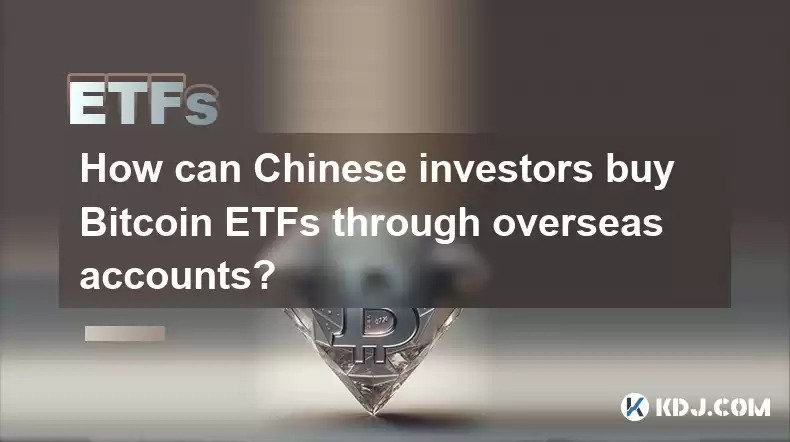
Navigating the Regulatory Landscape and Accessing Bitcoin ETFs
Investing in Bitcoin ETFs from China presents unique challenges due to the regulatory environment in both China and the countries offering these products. While direct investment in cryptocurrencies is heavily restricted within mainland China, accessing Bitcoin ETFs through overseas accounts offers a potential workaround. However, this path is not without its complexities and potential hurdles. Understanding these nuances is crucial before proceeding.
Opening an Overseas Brokerage Account
The first step involves establishing a brokerage account with an international firm that offers access to Bitcoin ETFs. This requires navigating international regulations and potentially meeting specific eligibility criteria. Not all brokerage firms cater to Chinese investors, and some may have restrictions on cryptocurrency-related investments. Thorough research is essential to identify a suitable brokerage that complies with both Chinese and international regulations.
- Choose a reputable international brokerage firm that allows access to Bitcoin ETFs.
- Carefully review the firm's terms and conditions, fees, and any restrictions on Chinese investors.
- Prepare the necessary documentation for account verification, which might include passport, proof of address, and potentially other financial documentation.
- Understand the currency conversion implications and associated fees. Transactions will likely involve converting Chinese Yuan (CNY) to the currency used by the brokerage (e.g., USD).
Understanding the Tax Implications
Tax implications are a significant concern. Capital gains taxes may apply in both China and the country where the ETF is listed. It's crucial to understand the tax laws of both jurisdictions to ensure compliance and avoid penalties. Seeking professional tax advice is strongly recommended, especially given the international nature of the investment. The complexity of international tax laws necessitates expert guidance to ensure accurate reporting and compliance.
Selecting the Right Bitcoin ETF
Multiple Bitcoin ETFs exist, each with its own investment strategy, fees, and risk profile. Carefully compare different ETFs to find one that aligns with your risk tolerance and investment goals. Consider factors like expense ratios, underlying assets, and the ETF's trading volume. Some ETFs might track the price of Bitcoin more closely than others, impacting your returns.
- Research various Bitcoin ETFs available on the chosen brokerage platform.
- Compare expense ratios and management fees to minimize costs.
- Analyze the ETF's past performance, but remember that past performance is not indicative of future results.
- Understand the risks associated with Bitcoin and the ETF's investment strategy.
Currency Exchange and Transfer Considerations
Transferring funds from a Chinese bank account to an overseas brokerage account involves navigating currency exchange rates and potential fees. Fluctuations in exchange rates can impact the overall investment returns. Understanding these dynamics is essential for accurate budgeting and managing expectations. Consider using a reputable currency exchange service to minimize transaction costs.
- Compare exchange rates offered by different banks and currency exchange services.
- Be aware of any fees associated with international wire transfers.
- Consider the timing of currency exchange to minimize potential losses due to fluctuations.
Regulatory Compliance and Risk Management
Navigating international regulations is crucial. Understanding the regulatory landscape in both China and the country where the ETF is listed is paramount. Changes in regulations in either jurisdiction could affect your ability to invest or access your funds. Staying informed about regulatory updates is essential for risk mitigation.
- Regularly check for any changes in regulations in both China and the country where the ETF is listed.
- Maintain accurate records of all transactions and tax documentation.
- Seek professional advice from financial advisors and tax professionals specializing in international investments.
Maintaining Security and Privacy
Protecting your investment and personal information is paramount. Use strong passwords, enable two-factor authentication, and be wary of phishing scams. Choose a reputable brokerage with robust security measures to protect your account and assets.
- Use strong and unique passwords for all accounts.
- Enable two-factor authentication wherever possible.
- Be cautious of suspicious emails or phone calls requesting personal information.
- Regularly review your account statements for any unauthorized activity.
Understanding the Risks Involved
Investing in Bitcoin ETFs, even through an overseas account, carries inherent risks. Bitcoin's price volatility is a significant factor, and market fluctuations can lead to substantial gains or losses. Other risks include regulatory changes, security breaches, and counterparty risk. Thoroughly understanding these risks before investing is crucial.
Frequently Asked Questions
Q: Are there any legal restrictions on Chinese investors buying Bitcoin ETFs overseas?
A: While direct cryptocurrency investment is restricted in mainland China, there are no explicit laws prohibiting Chinese citizens from investing in Bitcoin ETFs through overseas accounts. However, it's crucial to ensure compliance with both Chinese and international regulations.
Q: What are the tax implications of investing in Bitcoin ETFs from China?
A: Capital gains taxes may apply in both China and the country where the ETF is listed. Professional tax advice is highly recommended to understand and comply with the tax laws of both jurisdictions.
Q: What are the risks involved in buying Bitcoin ETFs through overseas accounts?
A: Risks include Bitcoin's price volatility, regulatory changes affecting both China and the ETF's jurisdiction, security breaches, counterparty risk, and currency exchange rate fluctuations.
Q: How can I choose a reputable international brokerage firm?
A: Research firms carefully, considering their reputation, regulatory compliance, fees, experience with international clients, and security measures. Look for firms regulated by reputable financial authorities.
Q: What documentation is typically needed to open an overseas brokerage account?
A: Typically, you'll need a passport, proof of address, and potentially other financial documentation. Specific requirements vary by brokerage firm.
Disclaimer:info@kdj.com
The information provided is not trading advice. kdj.com does not assume any responsibility for any investments made based on the information provided in this article. Cryptocurrencies are highly volatile and it is highly recommended that you invest with caution after thorough research!
If you believe that the content used on this website infringes your copyright, please contact us immediately (info@kdj.com) and we will delete it promptly.
- Bitcoin Strategy: Saylor's Not Hoarding, He's Building an Empire
- 2025-08-02 22:30:12
- Bitcoin Bloodbath: Macro Pressures and Liquidations Unleash Crypto Chaos
- 2025-08-02 22:30:12
- Tron, Cold Wallets, and Crypto Trends: What's Hot in the Market?
- 2025-08-02 23:10:12
- Bitcoin's Wild Ride: Davinci, Investors, and the $500K Dream
- 2025-08-02 23:50:12
- Worldcoin, Identity, WLD Price: Decoding the NYC Crypto Buzz
- 2025-08-02 21:10:12
- Shiba Inu: Utility and Community Strength Drive Crypto's Evolution
- 2025-08-02 21:50:12
Related knowledge
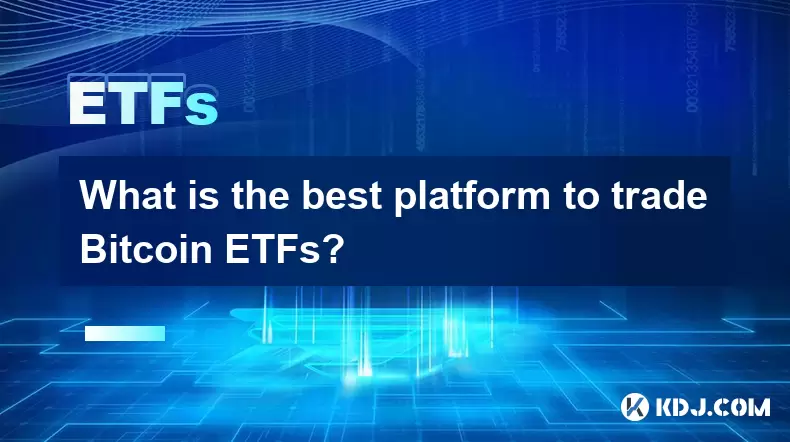
What is the best platform to trade Bitcoin ETFs?
Jul 23,2025 at 04:14am
Understanding Bitcoin ETFs and Their Role in TradingBitcoin Exchange-Traded Funds (ETFs) have gained significant traction among traditional and crypto...
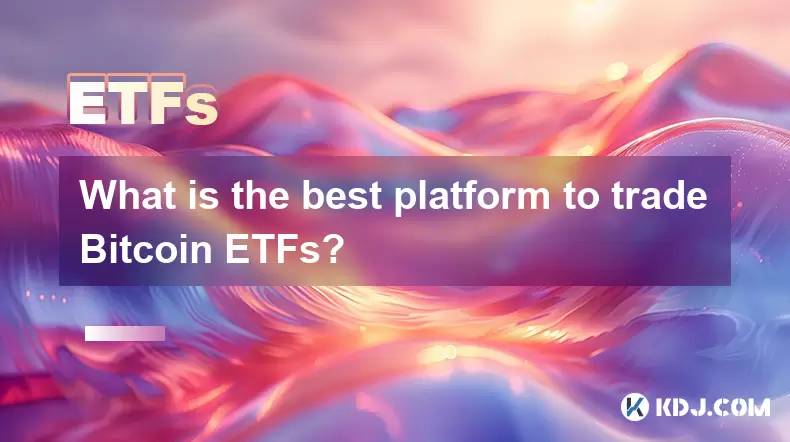
What is the best platform to trade Bitcoin ETFs?
Jul 17,2025 at 03:50pm
Understanding Bitcoin ETFs and Their Role in the MarketBitcoin Exchange-Traded Funds (ETFs) are investment vehicles that track the price of Bitcoin wi...
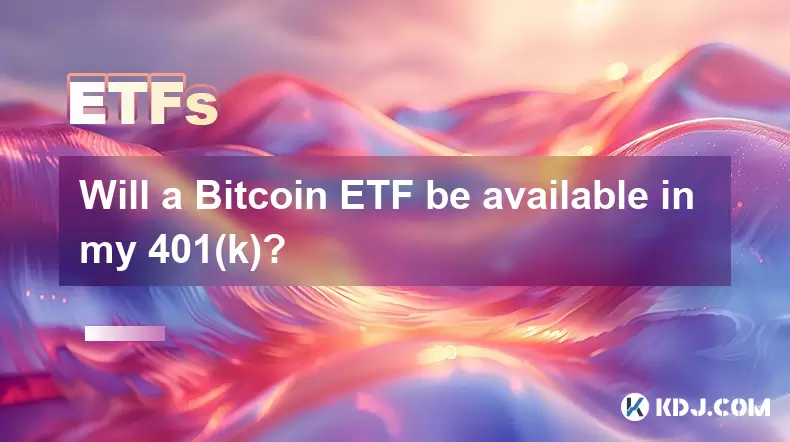
Will a Bitcoin ETF be available in my 401(k)?
Jul 17,2025 at 10:42pm
What is a Bitcoin ETF?A Bitcoin ETF (Exchange-Traded Fund) is an investment vehicle that tracks the price of Bitcoin without requiring investors to di...
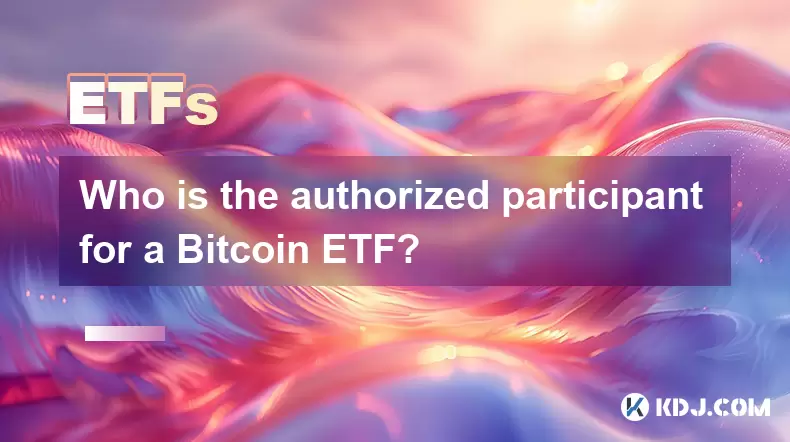
Who is the authorized participant for a Bitcoin ETF?
Jul 18,2025 at 12:42am
Understanding the Role of Authorized Participants in Bitcoin ETFsIn the context of Bitcoin Exchange-Traded Funds (ETFs), an authorized participant (AP...
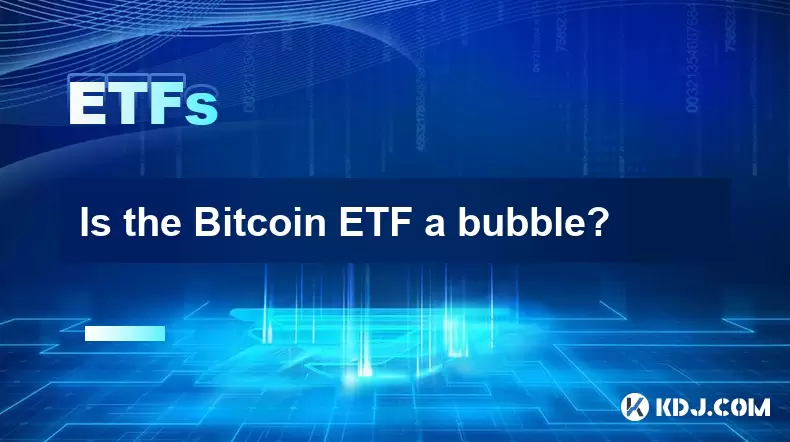
Is the Bitcoin ETF a bubble?
Jul 20,2025 at 06:57am
Understanding the Bitcoin ETF ConceptA Bitcoin Exchange-Traded Fund (ETF) is a financial product that aims to track the price of Bitcoin without requi...
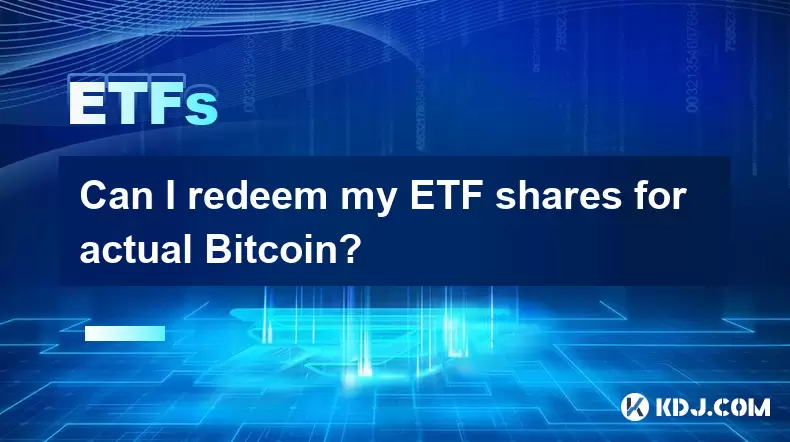
Can I redeem my ETF shares for actual Bitcoin?
Jul 17,2025 at 03:14pm
Understanding ETF Shares and Their Relation to BitcoinExchange-Traded Funds (ETFs) have become a popular investment vehicle for those looking to gain ...

What is the best platform to trade Bitcoin ETFs?
Jul 23,2025 at 04:14am
Understanding Bitcoin ETFs and Their Role in TradingBitcoin Exchange-Traded Funds (ETFs) have gained significant traction among traditional and crypto...

What is the best platform to trade Bitcoin ETFs?
Jul 17,2025 at 03:50pm
Understanding Bitcoin ETFs and Their Role in the MarketBitcoin Exchange-Traded Funds (ETFs) are investment vehicles that track the price of Bitcoin wi...

Will a Bitcoin ETF be available in my 401(k)?
Jul 17,2025 at 10:42pm
What is a Bitcoin ETF?A Bitcoin ETF (Exchange-Traded Fund) is an investment vehicle that tracks the price of Bitcoin without requiring investors to di...

Who is the authorized participant for a Bitcoin ETF?
Jul 18,2025 at 12:42am
Understanding the Role of Authorized Participants in Bitcoin ETFsIn the context of Bitcoin Exchange-Traded Funds (ETFs), an authorized participant (AP...

Is the Bitcoin ETF a bubble?
Jul 20,2025 at 06:57am
Understanding the Bitcoin ETF ConceptA Bitcoin Exchange-Traded Fund (ETF) is a financial product that aims to track the price of Bitcoin without requi...

Can I redeem my ETF shares for actual Bitcoin?
Jul 17,2025 at 03:14pm
Understanding ETF Shares and Their Relation to BitcoinExchange-Traded Funds (ETFs) have become a popular investment vehicle for those looking to gain ...
See all articles

























































































